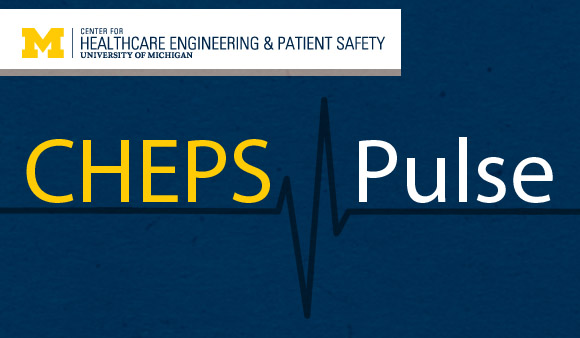In This Issue
Defining the Michigan Experience
A large part of what makes CHEPS special is the people involved. CHEPSters are intelligent, engaged, friendly, and committed to helping improve healthcare. They also have a wide variety of interests outside of CHEPS. Just as their CHEPS experience does, these interests shape and enrich their time at the University of Michigan.
Laura Hattar, an IOE undergraduate, has been playing clarinet since fifth grade and is now a member of the Michigan Marching Band. She said, “I think the best thing, aside from just getting to go to the games for free, is just getting to be a part of that hype around football. You’re a part of that brand. I think that’s really cool to be a part of. And also I’ve met so many super awesome people through the band. I know so many people that aren’t in engineering, just like a ton of different majors. Everyone comes from a different background. Getting that diverse group of friends is just an awesome experience. Through both CHEPS and band I’ve just been able to meet such wonderful people. That’s like the biggest thing.”

Amanda Naccarato, a nursing undergraduate, agrees with Laura’s assessment of band. She’s been interested in performing and singing since she was young and is now part of the Michigan Marching Band flag section and also the Women’s Glee Club and associated acapella group Midnight Blue which performs acapella pop songs. “Band is like an identity almost,” she said, noting that most of her friends and roommates are people she met through band. “The people you meet there and your section especially really become your family… you make connections that will last a lifetime because you just spend so much time together.”
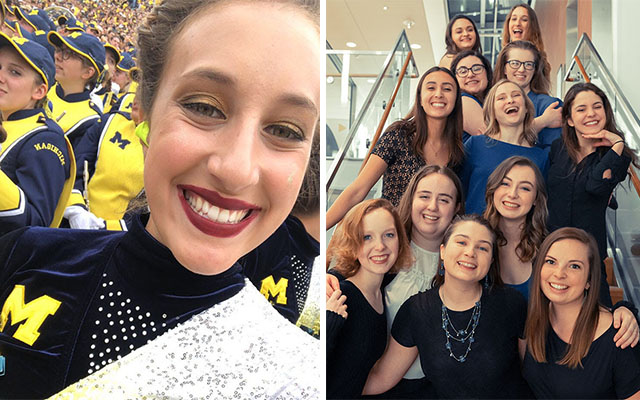
Right: the Midnight Blue acapella group
Biophysics undergraduate Fumiya Abe-Nornes met many of his closest university friends through the Japan Student Association (JSA). He joined in his freshman year, became treasurer in his sophomore year, and now in his junior year is one of the club’s vice presidents. “Since I’m one of the vice presidents I spent less time doing a lot of the nitty-gritty stuff and I spend more time looking at how our club is doing, what are we lacking in, what are we doing well, and how’s the turnout to our events.” He’s helped organize popular events like Asia’s Got Spice, where the JSA collaborated with other Asian interest organizations to share spicy foods that represented their culture, as well as movie nights featuring famous Japanese animated movies.
Since the JSA helped him make so many close friends, it’s important to Fumiya that others have a similar experience. “What I personally care about, and this is not to do with my role it’s about me as a person, is making sure people who do come want to come back again. Because a lot of times people come to an event and everybody already knows each other and they don’t feel, maybe they had a good time but nobody really reached out to them, so they feel like ‘I don’t really want to go again.’ So I focus on making sure that if somebody’s new that I really talk to them and introduce them to other people.” Fumiya also credits the JSA for giving him the confidence that led him to CHEPS. “Applying to places like CHEPS was also a result of JSA because I knew I have what it takes to work with a team, to be a leader, and I knew that I could also do that in other places,” he said.

The organizations she participates in led Hannah Heberle-Rosse to CHEPS in a different way. Now a Biomedical Engineering masters student, she began working with M-Heal and the Global Health Design Initiative as an undergraduate student. Her M-Heal team worked with a group called the Lily Project who traveled out to rural Nicaraguan, often having to hike several miles and perform exams wherever they could. The team worked to design an effective, low-cost, and portable gynecological exam table. “Those kinds of exams are uncomfortable in general… so they were trying to make it more medically beneficial so they’d walk in and see this medical table [that M-Heal designed] and feel like they were being taken care of,” said Hannah.
It was her work with the Global Health Design Initiative that sparked an interest that eventually brought Hannah to CHEPS. As part of the program, she traveled to Ghana and, alongside Ghanaian students, worked on a needs assessment at a hospital there. She came away from the experience with a project to diagnose post-partum hemorrhage more consistently and some insights into the workings of the hospital. She said, “Honestly when I was working the hospital in Ghana, most of the challenges I saw there were more systemic and not something like just a device could fix. It was more so the processes and how things were kind of being organized… I had a couple of friends who worked here so I always heard about CHEPS but didn’t really think I would have a place here as a BME with a Mechanical Engineering background but just the idea of improving healthcare on that side of the things drove me.”
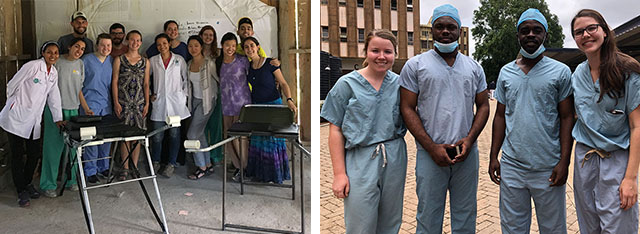
Right: Hannah (first on left) during her time in Ghana with the group of students she worked with closely
However students arrive at CHEPS, their experience here also colors their experience at the University of Michigan. IOE Ph.D. student Adam VanDeusen hopes to help make that experience a good one. Adam was the president of the University of Michigan INFORMS student chapter in 2019 and continues to be heavily involved as the former president. He recently participated in an exchange with the Northwestern INFORMS student chapter. INFORMS also helps students practice conference talks, holds workshops, and facilitates a mentorship program for Ph.D. students.
Adam also participates in the University of Michigan Mentorship Program as a mentor for incoming freshmen. He brings his enthusiasm for mentorship to CHEPS as well. “CHEPS was not something that existed when I was an undergrad and I really wish it would have,” he said. “That would have been a great experience for me and it would have really tied my interests together well. I think getting a chance to be a part of it when I came back for my Ph.D. – not only do I get to be in an area that has a great group of people and really motivated and intelligent students and staff but also I get to help give back to the students who would have been me in undergrad and I get to make sure that they get to do cool research and get interested in healthcare.”
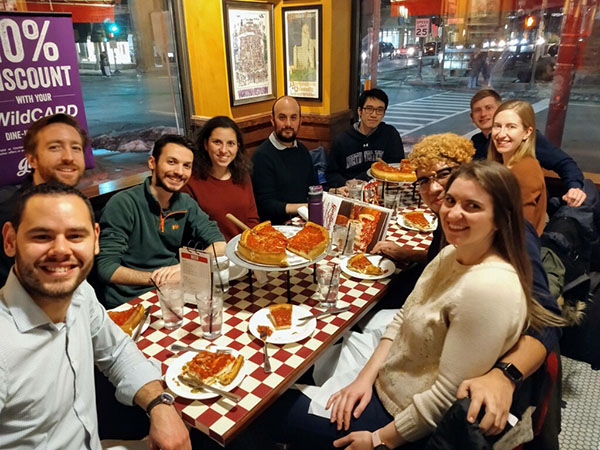
Amanda’s just a few months into her CHEPS career, but she already feels welcome at CHEPS and excited about her work here. She said, “Everyone has been super nice and super friendly and super welcoming which I’ve appreciated a lot. And I think it’s interesting to really see a different side of healthcare because I’ve only ever known the nursing aspect of healthcare… I want to help people, I want to make people feel better, which is why I chose nursing. I’ve never really known what’s gone on behind the scenes and this has been very eye-opening in that regard.”
Fumiya’s been at CHEPS for three semesters and said, “Very similar to JSA, CHEPS really just continues to boost my confidence as an individual and it’s teaching me a lot of collaboration skills, you know being a team lead, it’s also helping me be more organized and know how to communicate with people. So JSA, the one thing that everyone there has in common is an interest in Japan and here, it’s something else. It’s healthcare, it’s engineering. So it’s a completely different situation but I view it as the same. You use that connection to kind of facilitate growth as a community, to develop relationships with people.”
It’s clear that classes are just one piece of the Michigan experience. CHEPS and other activities outside of class can equally define a student’s college career. As Laura said, “Being able to five, ten years from now look back and say ‘I was a part of these things and I’m proud that I was able to do those things.’ I feel like everyone has their one thing at UMICH that they’ve done and they’re like ‘yeah, this is the best thing that I’ve done.’ I feel like band and CHEPS are my two little things that I’ll take away after graduation.”
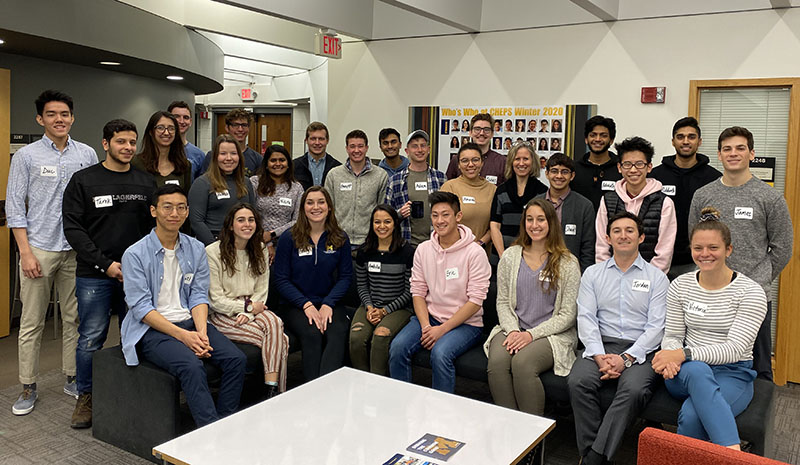
Recent News
- Data for Public Good Symposium, 2/25/20
- Lunch and Learn: Doug Wanty, 2/14/20
- IOE Graduate Recruits Visit CHEPS, 2/7/20
- INFORMS Exchange at Northwestern, 2/1/20
- Alum Theodore Endresen Visits CHEPS, 1/31/20
- CHEPS Movie Night, 1/31/20
Where in the World is CHEPS?
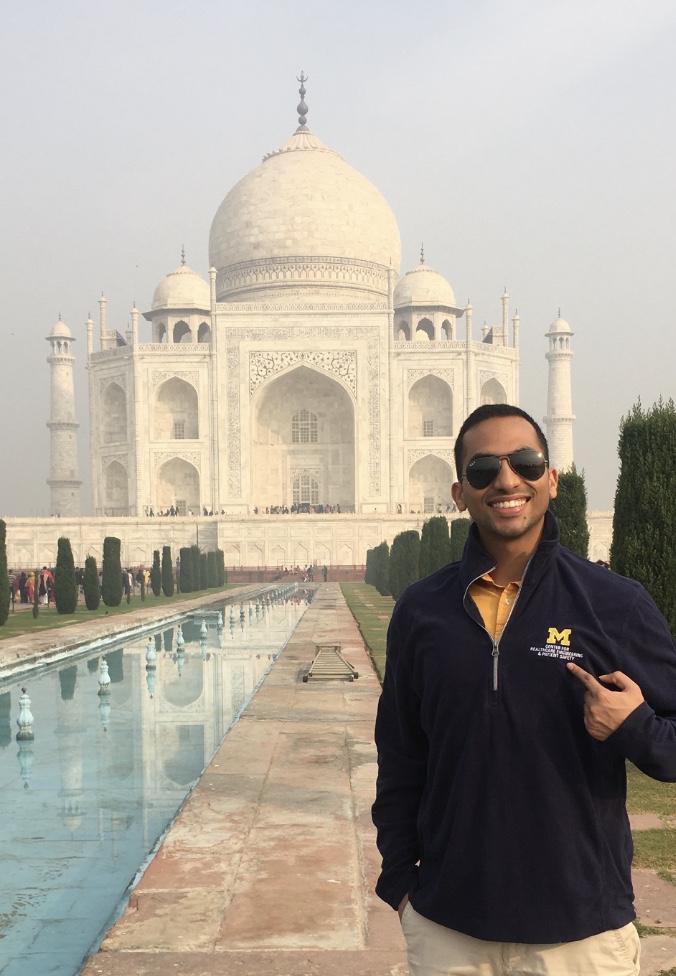
CHEPS alum Abhi is pictured at the Taj Mahal on a recent trip to India.
See more “Where in the World is CHEPS?” at our website.
Center for Healthcare Engineering & Patient Safety | University of Michigan
[email protected] | cheps.engin.umich.edu

